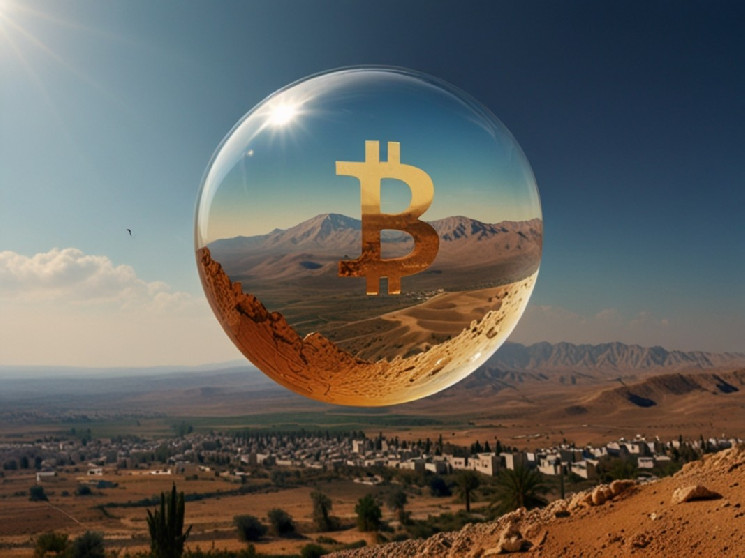
Syria’s economy is in a bad state, to put it very mildly. Not only has the Middle Eastern nation been battered by over a decade of war, the Assad regime, which has been in power since 1971, has now been overthrown by a jihadist group. The conflict, which began in 2011, has devastated infrastructure, displaced millions, and led to economic sanctions from Western nations. These factors have crippled the local economy and trade, leading to severe inflation. The Syrian pound (SYP), which was once relatively stable, has lost over 99% of its value since the war began whilst hyperinflation has turned basic goods, like bread and fuel, into luxuries for ordinary citizens.
In the face of these challenges, Syria has struggled to maintain monetary stability, with dwindling foreign currency reserves and limited access to global financial systems. However, hope may now be on the horizon since it has been announced that the Middle Eastern nation is planning to legalise Bitcoin, explore using it to back its national currency and use its energy reserves to mine it. This ground-breaking policy could transform not only Syria’s economy but serve as a potential model for other nations in the region that are also grappling with inflation and economic instability.
Bitcoin’s decentralized nature makes it immune to geopolitical pressures and the monetary policies of individual nations. This independence offers Syria a way to circumvent traditional financial systems dominated by Western powers and sanctions. Legalizing Bitcoin, and potentially backing the Syrian pound with it, will not only facilitate monetary stability but will do so in a manner that allows the struggling nation to become somewhat immune from regional economic shocks. Bitcoin could also allow citizens and businesses to transact with greater confidence and open up trade channels with countries around the world.
This does make one wonder, localised fiat systems were never a good way to cultivate trade and commerce in the Middle East, where many nations are heavily reliant on each other for basic goods and services and where borders can be porous. Many of these systems are also pegged to the US dollar which does offer a degree of stability but it also allows the US to export its inflation. The region has a long history of trade that relied on gold, since it was widely accepted and recognised as a sound store of value. Bitcoin can now play that role, as it is increasingly recognised as the best store of value and medium of exchange in the world. Bitcoin, like gold, is also much more in-tune with Islamic monetary principles, as I wrote about here.
Furthermore, Syria possesses significant energy reserves, particularly in oil and natural gas. However, due to the war, much of this potential has been untapped or disrupted. In recent years, global energy-intensive Bitcoin mining has demonstrated that regions with surplus energy resources can transform these assets into significant revenue streams. Syria’s plan to use its energy reserves to mine Bitcoin is both practical and innovative. By converting its natural resources into digital assets, Syria can generate wealth independent of traditional export markets. This revenue could then be used to bolster its economy, fund reconstruction projects, and stabilize the Syrian pound by creating Bitcoin-backed reserves. It also gives an incentive for small businesses to explore and invest in mining technology, which can lead to innovation in sustainable energy production and bolster the local economy.
One of the core objectives of Syria’s Bitcoin strategy is to restore trust in its national currency. By partially backing the Syrian pound with Bitcoin, the government can offer citizens a tangible reason to hold and use the local currency. A Bitcoin-backed pound could also attract foreign investment, particularly from tech-savvy individuals and organizations intrigued by the country’s adoption of the digital currency. Such a move also aligns with global trends. El Salvador, for instance, adopted Bitcoin as legal tender in 2021 and saw an increase in tourism and investment, despite initial scepticism. While Syria’s situation is more complex due to ongoing conflict and questions around the ideological inclinations of its new leaders, a similar strategy could yield long-term benefits once the country stabilises.
Syria is not alone in facing inflation and currency devaluation. Many countries in the Middle East and North Africa (MENA) region are grappling with similar issues. Lebanon, for example, has experienced a catastrophic financial collapse, with its currency losing over 95% of its value since 2019. Inflation across the region has eroded purchasing power, undermined trust in local currencies, and hindered economic growth. Governments reliant on imports have found it increasingly difficult to stabilize their economies as global commodity prices soar.
Syria’s legalization of Bitcoin and its plan to integrate it into its economy marks a significant turning point in global financial policy. The decentralised nature of Bitcoin gives nations the option to pursue financial empowerment in spite of the wider international context in which they find themselves in. It gives them a form of national self-custody which can act as a hedge against external powers seeking to influence domestic policy in their favour. Whilst challenges remain, such as the need for a better digital infrastructure and wider awareness of Bitcoin in neighbouring countries, it is certainly a bold step in the right direction.
If successful, Syria’s experiment could serve as a blueprint for other nations in the MENA region facing economic instability. By adopting Bitcoin, these nations can protect their citizens from the devastating effects of inflation, restore confidence in their currencies, and unlock new economic opportunities. Countries like Lebanon, Iraq, and Iran, which face similar challenges, could benefit tremendously from integrating Bitcoin into their financial systems. As the global financial landscape continues to evolve, Syria’s bold move into Bitcoin highlights the potential of Bitcoin to address some of the most pressing economic challenges of our time.
This is a guest post by Ghaffar Hussain. Opinions expressed are entirely their own and do not necessarily reflect those of BTC Inc or Bitcoin Magazine.
